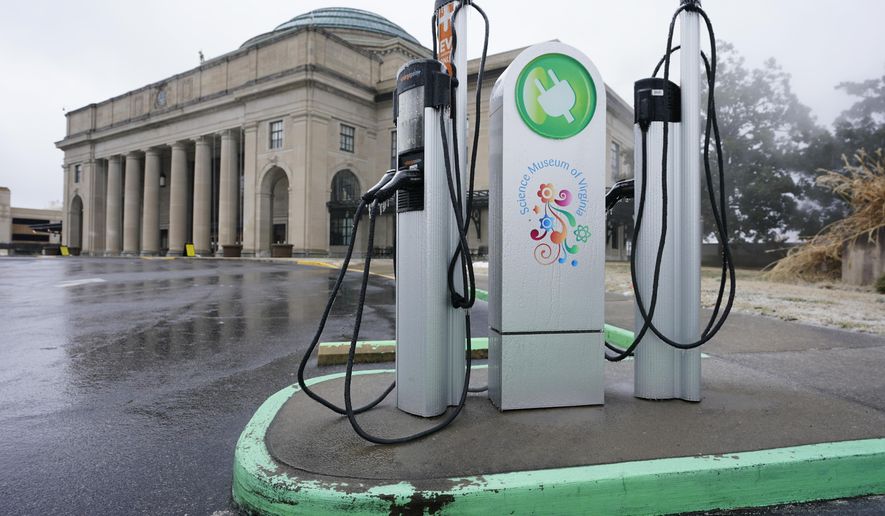RICHMOND, Va. — Virginia Senate Democrats on Tuesday defeated several Republican efforts to repeal a so-called “clean cars” law that aims to reduce carbon pollution through the adoption of California’s stringent rules for vehicle emissions.
The committee vote marked a critical juncture in the GOP repeal effort - one of this session’s highest-profile environmental debates. While there are still similar measures expected to advance through the Republican-controlled House, they would eventually land before the same Senate committee for a vote.
Environmental groups, who say the adoption of the standards was one of the biggest steps Virginia has taken to address climate change, cheered Tuesday’s outcome.
“The vote today shows that (Gov. Glenn) Youngkin-led attacks on Virginia’s bedrock climate laws are a dead end and that he should get on the side of making pollution progress and not stand against it,” said Walton Shepherd, Virginia policy director for the Natural Resources Defense Council.
Republicans sought unsuccessfully last year to repeal the 2021 law, and Youngkin pledged to try again after California in August set itself on a path to require all new cars, pickup trucks and SUVs be electric or hydrogen by 2035. Under California’s standards, drivers can keep their existing gas-powered cars or buy used ones.
Opponents of following California say its goals are unattainable and that the electric vehicles that will be required - and their batteries - are too expensive for many families. Speakers on Tuesday also raised concerns about whether the power grid would be able to handle the additional demand.
Some Republican senators asked their colleagues to consider at least delaying implementation of the standards.
“I hope that at least there’s a way we can amend this. Do something so that reasonable judgment can guide the day here,” Sen. Richard Stuart said.
The Senate Agriculture, Conservation and Natural Resources Committee ultimately rolled several similar repeal bills together before voting the consolidated bunch down on an 8-7 party-line vote vote.
The “clean cars” law was initially adopted two years ago, at a time when the state government was under full Democratic control. The measure that then-Gov. Ralph Northam signed into law was a top priority for environmental advocates at the time. It will require that starting in 2024 a certain percentage of new passenger vehicles sold by manufacturers be electric or hybrid electric.
The mechanism for reaching the mandated vehicle sales threshold - which would start at roughly 8% in 2024 and then increase each year - involves adopting California’s vehicle emissions standards. California has had the authority to set its own rules for decades under a waiver from the federal Clean Air Act.
The program applies to manufacturers, not car dealers. Manufacturers who aren’t in compliance can buy credits from others who have surpassed the target.
Advocates of the change argued that some automakers prioritize sending their electric vehicles, or EVs, to states that use California’s standards. They said that has meant supply in Virginia isn’t meeting demand, especially outside of the Washington suburbs.
The hope was that the law will make it easier and more likely that Virginians will choose cleaner cars and in turn help reduce pollution from the transportation sector, which federal data shows is Virginia’s single largest source of heat-trapping carbon dioxide.
Opponents argued when the Virginia law was adopted that the commonwealth shouldn’t be tying its future to California.
In August, after the California’s Air Resources Board further tightened its standards, state officials confirmed the change would apply to Virginia. Youngkin vowed to press for a repeal, saying he would work to “prevent this ridiculous edict from being forced on Virginians.”
“As the governor stated, Democrats in Virginia outsourced the decision-making on energy policy to unelected bureaucrats in California,” Youngkin’s spokeswoman, Macaulay Porter, said in a statement.
The governor has said he generally applauds efforts to move toward cleaner energy sources but thinks the methods adopted under previous years of Democratic control are too rigid.
A representative for the Alliance for Automotive Innovation, which represents most automakers, said during the committee hearing that it was neutral on the bill. But the representative, Josh Fisher, raised concerns that Virginia had not enacted policies since 2021 to help support hitting the thresholds of the mandate.
“I’m here to advocate for consumer purchase rebates, enhanced EV charging infrastructure build-out, updating your state building codes. These are all policies that you need to adopt if you’re going to move forward with this policy,” Fisher said.




Please read our comment policy before commenting.